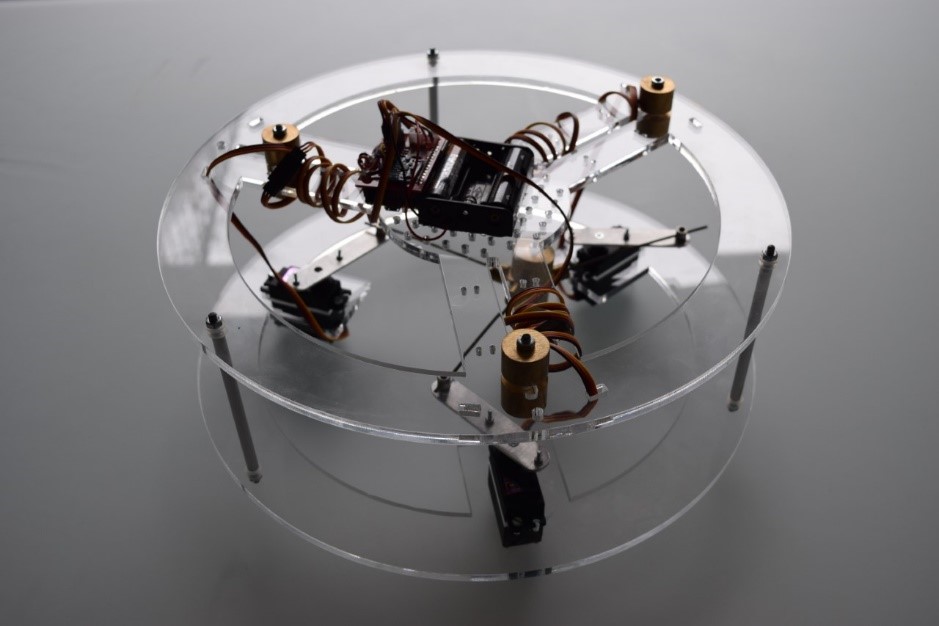Océane Patiny shone with her self-constructed remote controlled cylinder at the 31st EU Contest for Young Scientists in Sofia, Bulgaria.
What first started as a Swiss matura paper has become an EU-awarded project, honoured with a prize of €3’500: At the occasion of her final project at Gymnasium Provence in Lausanne, Océane Patiny had ventured on the conception and the open-source development of a robotic cylinder. The final prototype, weighing 1.4 kg and having a diameter of 32 cm, can be remotely controlled through a web page. In Switzerland, the conception and realization of such a personal ‘matura paper’ is mandatory in order to receive the Swiss matriculation certificate at the end of high school. “This project allowed me to combine my interests in mechanics, programming and electrical engineering at once”, says the 19-years old. “From the idea over machining the parts to assembling them, I did it all by myself.”
At the national competition ‘Swiss Youth in Science” in May of this year, Patiny’s remote controlled cylinder was selected with two other contributions to represent Switzerland at the 31st EU Contest for Young Scientists (EUCYS) in Sofia, Bulgaria. The big days then took place between 13 and 18 September: With Patiny, 155 contestants from 39 different countries had to display their projects in a public exhibition. For several days, they were required to answer questions from a scientific jury. “This led to interesting discussions with the jury members”, so Patiny. “The challenge was to break down my project far enough to make it comprehensible for scientists with other backgrounds.”
With interdisciplinarity and innovation to the third place
In the end, Patiny’s efforts were rewarded: Her project came up to the third place, together with three other young scientists from Belarus, Austria and Poland.
In its evaluation, the EUCYS jury highlighted besides the project’s interdisciplinary also the innovative approach Patiny has used to induce the robot’s movement: To this end, three motors have to be moved co-ordinately in order to move a mass inside the cylinder. When the mass is placed away from the centre, an imbalance is induced which makes the cylinder accelerate.
The European Commission established the European Union Contest for Young Scientists in 1989 to promote cooperation and exchange among young scientists and to provide guiding by prominent European researchers. The annual contest further aims to support national efforts in attracting young people to study and work in science, technology, engineering and maths (STEM). This year’s four winner scientists come from Ireland, Denmark, Germany and the United States.
Carlos Moedas, European Commissioner for Research, Science and Innovation, congratulated the winners for their “outstanding achievement” and expressed his conviction that “we will see many of the […] participants hitting the headlines in the coming years with breakthrough discoveries and innovations.”
Overall, the awards comprise a total of €62’000 in prize money as well as special prices such as science trips. This also applies to Océane: Besides the €3’500 she won, Patiny will have the possibility to spend one week at the European Space Agency (ESA) in Paris, France. “I am very happy about this opportunity and I am sure to benefit a lot from this concrete experience ‘in the field’”, she says.
Mobility as a goal
“The participation at the EUCYS was a truly enriching experience for me, especially the exchange with the other participants”, Patiny concludes. “This allowed me to see different scientific problems people from other countries are confronted with and how they proceed to resolve them.”
While currently completing a 10 months internship in a technology and programming start-up, Patiny intends to take up her studies at the School of Management and Engineering Vaud in Yverdon-les-Bains. “I like having practical over theoretical trainings”, she states. However, she can well imagine herself studying abroad at a later stage, “probably in the United Kingdom or in Germany”.

